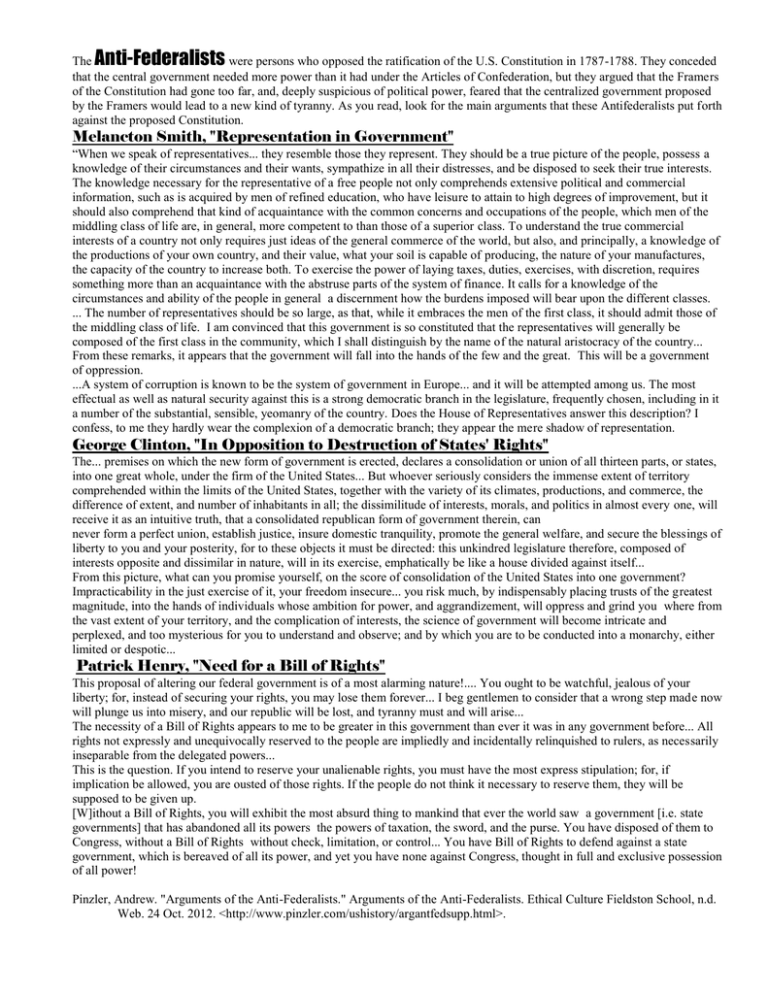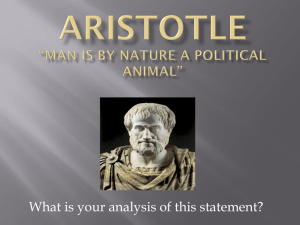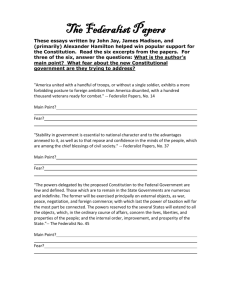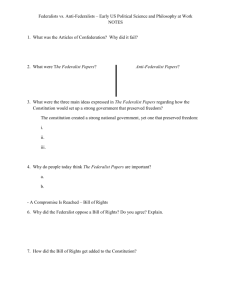The Anti-Federalists were persons who opposed the ratification of
advertisement

Anti-Federalists The were persons who opposed the ratification of the U.S. Constitution in 1787-1788. They conceded that the central government needed more power than it had under the Articles of Confederation, but they argued that the Framers of the Constitution had gone too far, and, deeply suspicious of political power, feared that the centralized government proposed by the Framers would lead to a new kind of tyranny. As you read, look for the main arguments that these Antifederalists put forth against the proposed Constitution. Melancton Smith, "Representation in Government" “When we speak of representatives... they resemble those they represent. They should be a true picture of the people, possess a knowledge of their circumstances and their wants, sympathize in all their distresses, and be disposed to seek their true interests. The knowledge necessary for the representative of a free people not only comprehends extensive political and commercial information, such as is acquired by men of refined education, who have leisure to attain to high degrees of improvement, but it should also comprehend that kind of acquaintance with the common concerns and occupations of the people, which men of the middling class of life are, in general, more competent to than those of a superior class. To understand the true commercial interests of a country not only requires just ideas of the general commerce of the world, but also, and principally, a knowledge of the productions of your own country, and their value, what your soil is capable of producing, the nature of your manufactures, the capacity of the country to increase both. To exercise the power of laying taxes, duties, exercises, with discretion, requires something more than an acquaintance with the abstruse parts of the system of finance. It calls for a knowledge of the circumstances and ability of the people in general a discernment how the burdens imposed will bear upon the different classes. ... The number of representatives should be so large, as that, while it embraces the men of the first class, it should admit those of the middling class of life. I am convinced that this government is so constituted that the representatives will generally be composed of the first class in the community, which I shall distinguish by the name of the natural aristocracy of the country... From these remarks, it appears that the government will fall into the hands of the few and the great. This will be a government of oppression. ...A system of corruption is known to be the system of government in Europe... and it will be attempted among us. The most effectual as well as natural security against this is a strong democratic branch in the legislature, frequently chosen, including in it a number of the substantial, sensible, yeomanry of the country. Does the House of Representatives answer this description? I confess, to me they hardly wear the complexion of a democratic branch; they appear the mere shadow of representation. George Clinton, "In Opposition to Destruction of States' Rights" The... premises on which the new form of government is erected, declares a consolidation or union of all thirteen parts, or states, into one great whole, under the firm of the United States... But whoever seriously considers the immense extent of territory comprehended within the limits of the United States, together with the variety of its climates, productions, and commerce, the difference of extent, and number of inhabitants in all; the dissimilitude of interests, morals, and politics in almost every one, will receive it as an intuitive truth, that a consolidated republican form of government therein, can never form a perfect union, establish justice, insure domestic tranquility, promote the general welfare, and secure the blessings of liberty to you and your posterity, for to these objects it must be directed: this unkindred legislature therefore, composed of interests opposite and dissimilar in nature, will in its exercise, emphatically be like a house divided against itself... From this picture, what can you promise yourself, on the score of consolidation of the United States into one government? Impracticability in the just exercise of it, your freedom insecure... you risk much, by indispensably placing trusts of the greatest magnitude, into the hands of individuals whose ambition for power, and aggrandizement, will oppress and grind you where from the vast extent of your territory, and the complication of interests, the science of government will become intricate and perplexed, and too mysterious for you to understand and observe; and by which you are to be conducted into a monarchy, either limited or despotic... Patrick Henry, "Need for a Bill of Rights" This proposal of altering our federal government is of a most alarming nature!.... You ought to be watchful, jealous of your liberty; for, instead of securing your rights, you may lose them forever... I beg gentlemen to consider that a wrong step made now will plunge us into misery, and our republic will be lost, and tyranny must and will arise... The necessity of a Bill of Rights appears to me to be greater in this government than ever it was in any government before... All rights not expressly and unequivocally reserved to the people are impliedly and incidentally relinquished to rulers, as necessarily inseparable from the delegated powers... This is the question. If you intend to reserve your unalienable rights, you must have the most express stipulation; for, if implication be allowed, you are ousted of those rights. If the people do not think it necessary to reserve them, they will be supposed to be given up. [W]ithout a Bill of Rights, you will exhibit the most absurd thing to mankind that ever the world saw a government [i.e. state governments] that has abandoned all its powers the powers of taxation, the sword, and the purse. You have disposed of them to Congress, without a Bill of Rights without check, limitation, or control... You have Bill of Rights to defend against a state government, which is bereaved of all its power, and yet you have none against Congress, thought in full and exclusive possession of all power! Pinzler, Andrew. "Arguments of the Anti-Federalists." Arguments of the Anti-Federalists. Ethical Culture Fieldston School, n.d. Web. 24 Oct. 2012. <http://www.pinzler.com/ushistory/argantfedsupp.html>. Excerpts from The Federalist Papers "[I]t is to be remembered, that the general government is not to be charged with the whole power of making and administering laws. Its jurisdiction is limited to certain enumerated objects, which concern all the members of the republic, but which are not to be attained by the separate provisions of any. The subordinate governments which can extend their care to all those other objects, which can be separately provided for, will retain their due authority and activity." - The Federalist No. 14 "[I]t appears on the one hand that the Constitution is to be founded on the assent and ratification of the people of America, given by deputies elected for the special purpose; but on the other, that this assent and ratification is to be given by the people, not as individuals comprising one entire nation; but as composing the distinct and independent States to which they respectively belong. It is to be the assent and ratification of the several States, derived from the supreme authority in each State, the authority of the people themselves. The act therefore establishing the Constitution, will not be a national but a federal act." - The Federalist No. 39 “The powers delegated by the proposed Constitution to the Federal Government are few and defined. Those which are to remain in the State Governments are numerous and indefinite. The former will be exercised principally on external objects, as war, peace, negotiation, and foreign commerce; with which last the power of taxation will for the most part be connected. The powers reserved to the several States will extend to all the objects, which, in the ordinary course of affairs, concern the lives, liberties, and properties of the people; and the internal order, improvement, and prosperity of the State.”The Federalist No. 45 "The operations of the Federal Government will be most extensive and important in times of war and danger; those of the State Governments, in times of peace and security. As the former periods will probably bear a small proportion to the latter, the State Governments will here enjoy another advantage over the Federal Government. The more adequate indeed the federal powers may be rendered to the national defense, the less frequent will be those scenes of danger which might favor their ascendancy over the governments of the particular States.” – The Federalist No. 45 “The accumulation of all powers legislative, executive and judiciary in the same hands, whether of one, a few or many, and whether hereditary, self appointed or elective, may justly be pronounced the very definition of tyranny.” -- The Federalist No. 47 “But what is government but the greatest of all reflections on human nature? If men were angels, no government would be necessary. If angels were to govern men, neither external nor internal controls on government would be necessary. In framing a government which is to be administered by men over men, the great difficulty lies in this: You must first enable the government to control the governed; and in the next place, oblige it to control itself. A dependence on the people is no doubt the primary control on the government; but experience has taught mankind the necessity of auxiliary precautions.” – The Federalist No. 51 “Whoever attentively considers the different departments of power must perceive, that in a government in which they are separated from each other, the judiciary, from the nature of its functions, will always be the least dangerous to the political rights of the constitution; because it will be least in a capacity to annoy or injure them. The executive not only dispenses the honors, but holds the sword of the community. The legislature not only commands the purse, but prescribes the rules by which the duties and rights of every citizen are to be regulated. The judiciary on the contrary has no influence over either the sword or the purse, no direction either of the strength or of the wealth of the society, and can take no active resolution whatever. It may truly be said to have neither Force nor Will, but merely judgment; and must ultimately depend upon the aid of the executive arm even for the efficacy of its judgments.” -- The Federalist No. 78 “The courts must declare the sense of the law; and if they should be disposed to exercise WILL instead of JUDGMENT, the consequence would equally be the substitution of their pleasure to that of the legislative body.” The Federalist No. 78 “[T]he judicial authority of the federal judicatures, is declared by the constitution to comprehend certain cases particularly specified. The expression of those cases marks the precise limits beyond which the federal courts cannot extend their jurisdiction; because the objects of their cognizance being enumerated, the specification would be nugatory if it did not exclude all ideas of more extensive authority.” – The Federalist No. 83 "Excerpts from The Federalist Papers." Federalist Society for Law and Public Policy Studies. University of Maryland Francis King Carey School of Law, 2012. Web. 24 Oct. 2012. <http://www.law.umaryland.edu/students/life/orgs/fedsoc/excerpts.html>.





